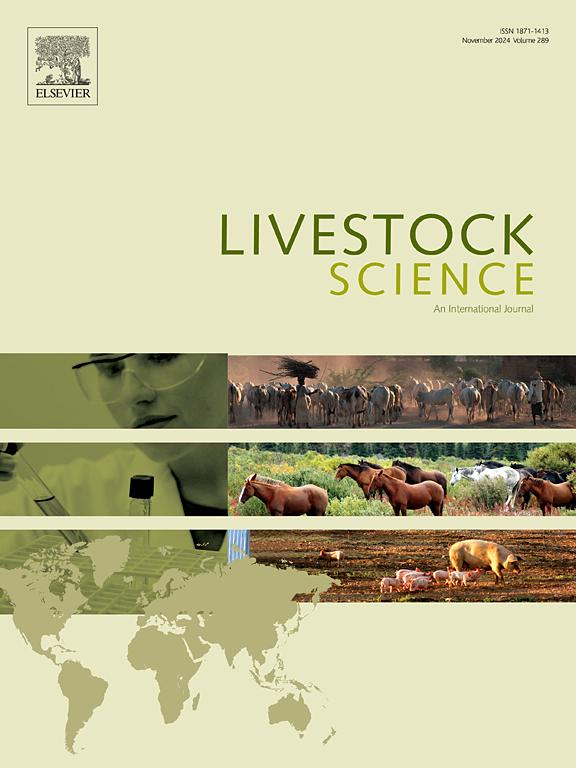丹麦生猪生产中无锌药品管理——来自农民和兽医的见解
IF 1.9
3区 农林科学
Q2 AGRICULTURE, DAIRY & ANIMAL SCIENCE
引用次数: 0
摘要
2022年6月,丹麦当局实施了欧盟对猪群中“药用水平氧化锌”(pZnO)的禁令,以保护环境免受重金属污染。禁令实施后,抗生素的使用有所增加,尤其是用于治疗断奶后腹泻。该研究通过对农民(n = 10)和兽医(n = 8)的联合半结构化访谈来探讨丹麦猪群面临的挑战以及禁令后抗生素使用增加的背景。采访在2024年1月至4月期间进行。受访者解释说,不提供氧化锌往往会导致腹泻、普遍不节俭、抗生素使用增加和抗生素耐药性问题。保护猪免受断奶后腹泻的最常见措施是改变饲养管理,以确保稳定的采食量并避免高水平的蛋白质。然而,在许多情况下,这些变化并没有抵消负面影响,一些猪群继续与不节俭的猪作斗争。令人惊讶的是,大多数兽医都无法解释为什么有些畜群相对没有受到影响,而另一些则经历了严重的问题。该研究揭示了现代丹麦养猪业的限制性系统条件,以及它们如何影响适应社会需求的可能性。许多人同意,降低牲畜密度和增加断奶年龄等广泛的管理措施可能使断奶不需要药物,但这些措施通常被认为过于昂贵。除了疾病发生率增加之外,监管框架和支持“顺利生产”的意图也解释了抗生素使用增加的原因。本文章由计算机程序翻译,如有差异,请以英文原文为准。
Managing without pharmaceutical zinc in Danish pig production – insights from farmers and veterinarians
In June 2022, Danish authorities implemented the EU ban on ‘pharmaceutical levels of zinc oxide’ (pZnO) in pig herds to protect the environment from pollution from heavy metals. Following the ban, an increased use of antibiotics was seen, especially for treating post-weaning diarrhoea.
The study used joint semi-structured interviews with farmers (n = 10) and vets (n = 8) to explore the challenges encountered in Danish pig herds and the background for the increased use of antibiotics following the ban. Interviews were carried out between January and April 2024.
Interviewees explained how diarrhoea, general unthriftiness, increased use of antibiotics and problems with antibiotic resistance were often the consequences of not providing pZnO. The most common measures to protect pigs from postweaning diarrhoea were changes in feeding management to ensure a steady feed intake and to avoid high levels of protein. However, in many cases such changes did not offset the negative effects, and some herds continuously struggled with unthrifty pigs. Surprisingly, most vets could not explain the possible reason that some herds were relatively unaffected whilst others experienced severe problems.
The study sheds light on the restrictive systemic conditions in modern Danish pig farming and how they affect the possibilities for adapting to societal demands. Many agreed that extensive management measures like lowered stocking density and increased weaning age might enable weaning without pharmaceuticals, but these measures were generally considered too expensive. In addition to increased disease occurrence, the increased use of antibiotics was explained by regulatory frameworks and intentions to support a ‘smoothly running production’.
求助全文
通过发布文献求助,成功后即可免费获取论文全文。
去求助
来源期刊

Livestock Science
农林科学-奶制品与动物科学
CiteScore
4.30
自引率
5.60%
发文量
237
审稿时长
3 months
期刊介绍:
Livestock Science promotes the sound development of the livestock sector by publishing original, peer-reviewed research and review articles covering all aspects of this broad field. The journal welcomes submissions on the avant-garde areas of animal genetics, breeding, growth, reproduction, nutrition, physiology, and behaviour in addition to genetic resources, welfare, ethics, health, management and production systems. The high-quality content of this journal reflects the truly international nature of this broad area of research.
 求助内容:
求助内容: 应助结果提醒方式:
应助结果提醒方式:


